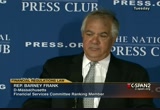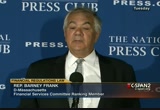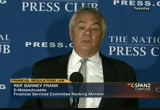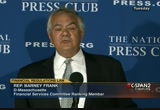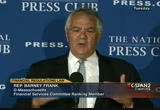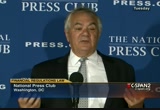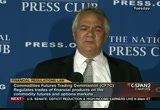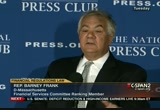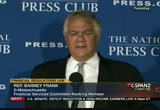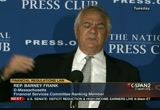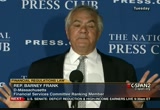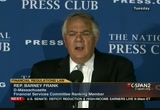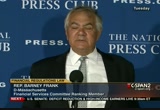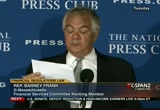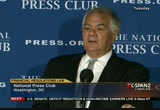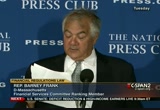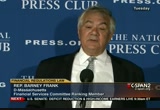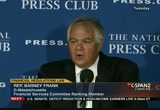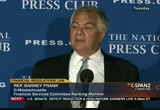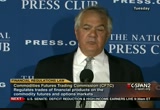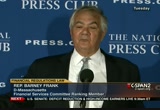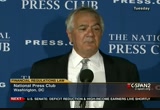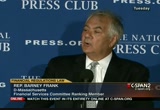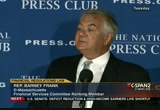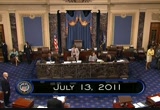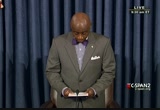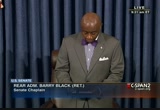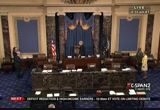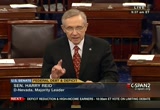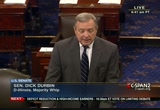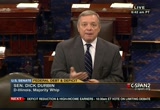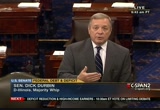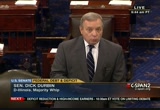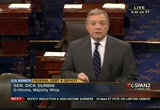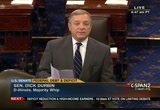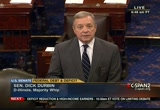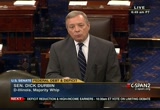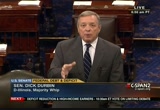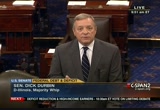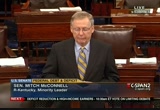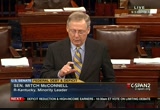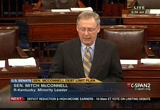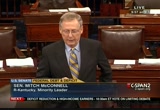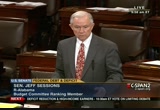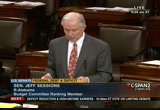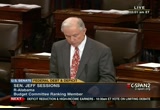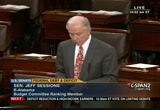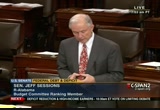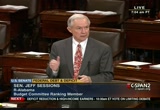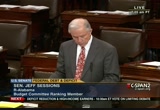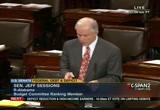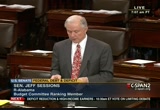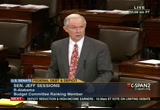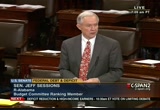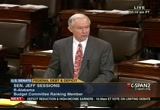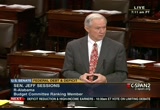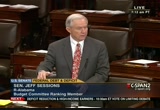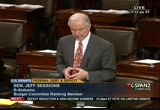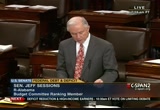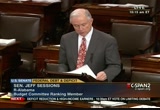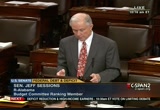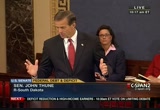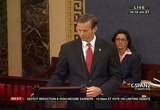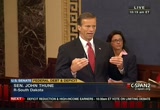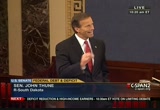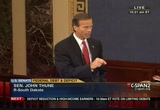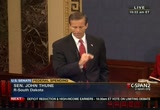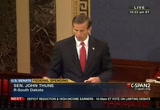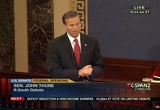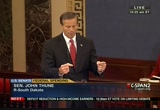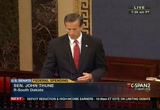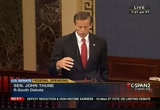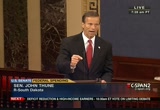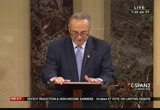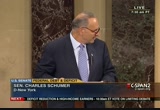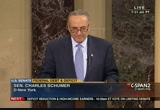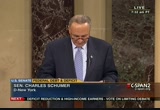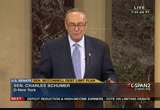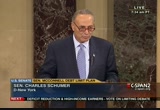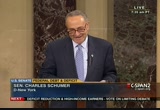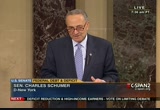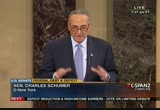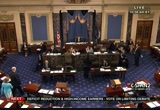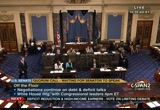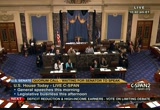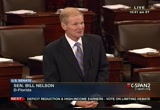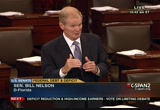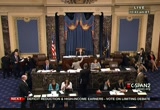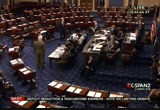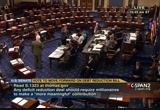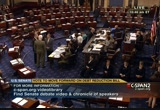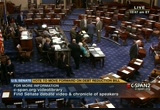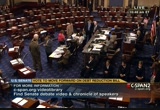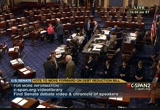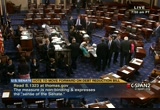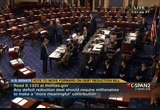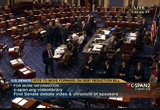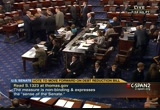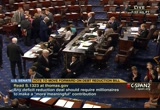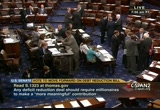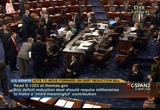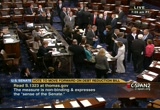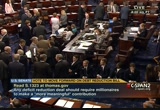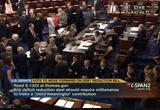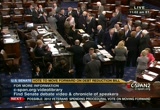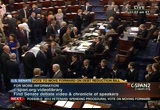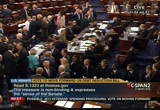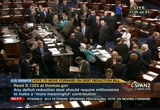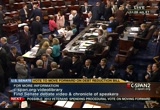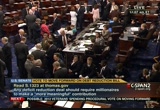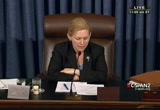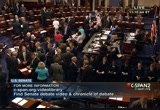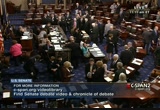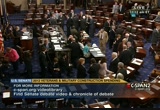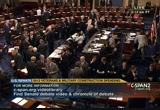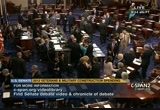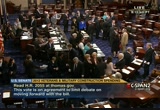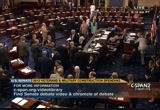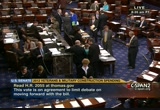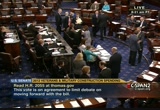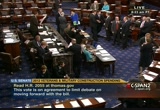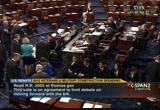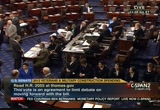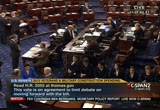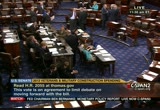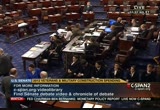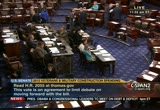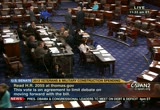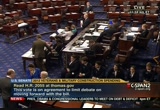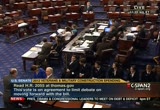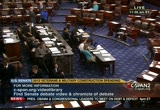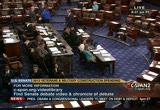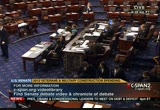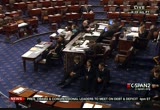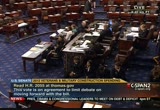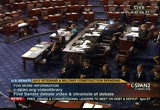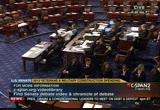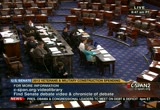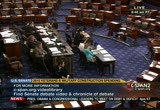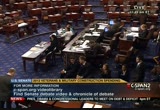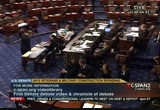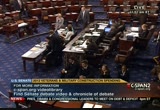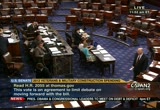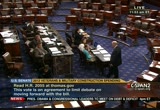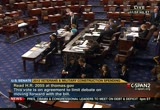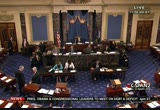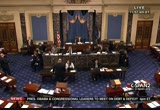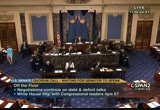tv U.S. Senate CSPAN July 13, 2011 9:00am-12:00pm EDT
9:00 am
services committee. ron paul, thaddeus, and michele bachmann. i'm going to talk to the capitol police. i hope people won't need to get by the secret service to get to work. i don't think we've ever had three declared congressional candidates on one congressional committee before. anyway, on the financial reform bill. i wanted to do this because it is a year. and we -- i think, are in a position to make some judgments about this. i want to begin by saying that i believe that the years study, examination, criticism, advocacy, et cetera, leaves the legislature holding up very well. the republicans have had enough of hearings and there have been very few calls for any substantial amendment on the part of the financial service committee. in fact, one the things that i
9:01 am
thought quite inappropriately, people pointing at the criticism, is as we knew would be a strength. that is the fact that what the bill does in many cases is to set forth some very important principals. but gives the regulators the ability to apply them in practice. now there were two reasons for that. first of all, you cannot in 2010 decide for the indefinite future what certain specific numbers ought to be. capital ratios, et cetera. secondly, to the extent when you legislate that you get very specific, you are inviting the people about whom you are legislating to evade what you did. the more specific, as a matter of fact, you will remember for many years, people in the financial community were telling us to be more like england where they did principals and not rules. we do think we need rules. but you cannot legislate some of
9:02 am
these very important questions. and as people have come before the committee, they have talked about, for example, with regard to taking into account international competitive factors with regard to imposing margin on end users when we were talking about american subsidiary based in a foreign country, dealing with the nonamerican customer, the regulators have their flexibility to deal with that. the volcker rule, which many in the banking community didn't like, but they have acknowledged the way it was written, the regulators have a flexibility to apply it in a way that we think does the good without doing the harm. and that's true in a number of other areas. so i think that's a factor. there is -- the only issue where i saw people on the whole in the financial community unhappy and the banks was the amendments sponsored by former senator lincoln to push derivatives out of the bank. i always felt it was more important to have rules for derivatives, and the options, i
9:03 am
think some others do, i am shocked at least in public at how little advocacy there has been for substantial change. i also think things are moving well in the international fund. when i was about to become chairman of the committee in 2006, we were being told that we had to cut back substantially on american regulation because everybody could go to more welcoming jurisdictions, the financial service authority with their quote and light touch, unquote, regulation was advocated. about a year and a half later, the chairman of it said the era of light touch regulation is over. and, in fact, we no longer have that. i think america is in the need for the pushing forward. some of the friends in europe understand that now. there were european countries,
9:04 am
germany, they didn't make the loans. they went bankrupt because other people did. mainly in america. there is the degree of interconnection. by the way, the side, directly relevant to how we got here. we've -- we were told obviously in 2008 by the bush appointees, ben, and hank, and others that we were facing something as bad as the great depression. i think it could have been worse. because 80 years ago, you had an -- there was agranularty to the economy. things could be going very bad in one place, but they could be going well elsewhere. there was more of a localism to it. by now everything is connected. when they bog down one place, they bog down another. that's an argument, you are not going to see this. some of the european allies or friendly competitors under went such turmoil themselves in the last few years. and many cases worse off than we
9:05 am
are because we have dealt with it more forthrightly. you no longer have the let's have people come over here. as a matter of fact, many of you european institutions are complaining loudly to their regulators that america is nicer, for example, in compensation, while there are some legitimate issues that have been to be addressed on imposing marge gin requirements on end users and other countries, some of the financial institutions sometimes sound like the 14-year-old child of divorced parents. trying to play mommy against daddy. if you don't let me stay up late, i'm moving over there. the regulators have been talking. i do not think we see the serious. that includes the capital surcharge for systemically important financial institutions. in fact, one the things that submerged that's been debated about too big to fail, there's no point they did. in fact, when the republicans have the hearings on the international competition, two
9:06 am
industry witnesses, one representing the bank, orientation, and one house from harvard who's been the supporter of a strong event and industry and skeptical of some regulations and committee both noted that there was a potential competitive disadvantage for large american financial institutions because we are so firm in not allowing bailouts. they noted that america has by far the strongest anti-public participation in bailout law and rules in the world and that this could be a problem for american institutions and others. the argument, bit way, that being designated as a systemically important financial institution is an advantage because you will be able to borrow more cheaply. this is -- we've heard of the gift that keeps on giving -- this is the gift that people keep on refusing.
9:07 am
unanimously, any institution there that's discretion about to whether or not it was designated as systemically important has vehemently asked not to be. the notion that it somehow gives you a benefit apparently all of the people have suddenly become very self-sacrificing. i was hoping to get into neutral. now you can't give them away. the fact is overwhelmingly, people do not want to be designated because it what it carries. i will say, and i've said this before, i poured this out to governor of the federal reserve to the extent that he talks about adding an element to the charge of the systemically important financial institutions to off set any advantage they might get. he's mistaken. the way to deal with that is to help us get rid of the perception. it's one the rating agencies moving in that direction. it's overwhelming and, in fact, a couple of the businesses of the america at this point, lehman brothers and not something that was done, they say that's the only example of major financial institution in
9:08 am
the developed company being allowed to totally fail with nothing. that one, the evidence clearly puts to rest. this notion that we didn't deal with too big to fail. there are a couple of areas where i see the colleagues in climate change and health care don't want to take it on because it's still too popular. coming to the defense of derivative trading is not a particular cause. they are coming at it sideways. one is to try to use the deficit as an excuse for under funding the scc and cftc. they are being denied the funds that it needs that is a small percentage for wasting infrastructure in afghanistan. the notion that the cftc that the 80 or $90 billion more that
9:09 am
we need can't be done because of the deficit that people spent in $147 billion so we can keep subsidizing american farmers is nonsense. similarly with the fcc they want to turn in. they will bring in more money to the system than it will be given to run it. that's one effect. in fact, what you have running here is a catch 22. first, deny the fcc and cftc adequate funding. they in turn are not able to deal with the rulemaking requirements that they have. then because we haven't been able to move as quickly, that's something they have imposed. obviously, you want the fcc and cftc to have smart people and information technology. i have to say i do not see it coming from the financial institutions. many of them recognize while you may not like the rules, if you've got the rules, you want them well run.
9:10 am
this is coming from the republican party who just believe despite all of the evidence to the contrary that an unregulated free market works. you saw this in the "financial times" in alan greenspan article. it's as if the last few years never happen. the only problem, i have been disappointmented at the pace of appointments from obama. we knew the currency needs to be appointmented, they have now come up with tom curry. on the other hand, there have been cases where they have made good appointments, joe smith from north carolina, the bipartisan bank commission in north carolina, brutally rejected. i mean brutally, treated like he was a disrespectable person by the senate republicans. now they will confirm nobody to the cfpb unless we undermine the purpose of it. the purpose was to give them independence from the bank
9:11 am
regulators, now they want to suggest them. that is an absolute perversion. there is the legislative power and confirmation power. announcing that will you not use the confirmation until you get by that extortion that you can't get is a perversion of the constitution. and there's one final area that i am troubled by. here i have to say some of my liberal friends are part of the problem. single biggest cause of all of this was the ability of people to make mortgage loans with either regulation nor risk. now we have dealt with that in substantial part. and banks, particularly the community banks, get unjustifiably unhappy. because if only those institutions technically known as banks depository institutions
9:12 am
that get depository insurance, if only they had made mortgage loans, we would not have had the crisis. part of the problem is couple of things grew up, great sources of liquidity out of the deposits and revolution that allows institutions that were essentially unregulated to make mortgage loans. you had the worst of both worlds, because some banks were able to set up subsidiaries that were not subject to the full regulation, because they were affiliates of the national bank and the control of the currency did in 2004, they weren't subject to state regulation either. you created a vacuum. that was a bipartisan mistake, it was a clinton appointee who was the holdover as control of the currency in 2004 greatly over preempted. and we see the current control we're trying to maintain in direct contradiction to what the bill says. that's one the things that has to be corrected.
9:13 am
but the problem was that people were able to make loans without regulations and without risk. we've solved part of the problem under the legislation, the consumer financial protection bureau has jurisdiction now over activity, and that's one the things we try to do in the bill, is to regulate activity, not institutions. if you regulate by institution, an institution can change it's shirt and avoid regulation. go shopping for different regulators. you now have a regulation by activity. whether it's derivatives or whether it's mortgages and the cfpb will now have rules for all mortgages and it has some substantive rules for all mortgages. so we have dealt with that, but there was the second part of it. i believe that will be well done. and they have the ability to put services requirements going forward. it's very hard to undo the mess that we have now with services retroactively. but we can and i believe the cfpb will prevent that from
9:14 am
happening again. there was another asset. if people don't have the incentive to make good mortgages, that can be repaid, you are going to have trouble. that's why risk retention was so important. i am troubled because there is an assault now on risk retention. and i agree that a 20% requirement for a qualified mortgage is higher than it has to be. but unfortunately, in some of my friends in the advocacy groups are involved in this, there is a subtle shift here in which people have stopped objecting to what's involved in the qualified residential mortgage as an exception and have instead tried to claim it should be the rule. there is a general notion that risk retention and mortgages really is too burdensome. and that the combination of the rules and risk retention will mean you can't get mortgages. i was just rereading the testimony before the senate in which this was created. he has been critical in the way
9:15 am
of which some of this has happen. but his testimony in favor of legislation to allow securitization to go forward is in 1986. so if you are listen to these people, you got to wonder how do we ever get any mortgages made to 1996. if securitization is essential to mortgages and risk retention ruin securitization, what the hell are all of these people living in before 1986? i will tell you what we are trying to do with derivatives, putting them into clearinghouses and exchanges and requiring margin when the financial institutions tale with each other, and aig and goldman sachs. we don't think they should be allowed to do it the way they did before. it's disruptive. we haven't done it this way. it's going to be harder. it might cost us more. yes, it's disruptive, because we had a disrupt a rotten system. we had to disrupt a system
9:16 am
that's collapsened. and it collapsed between risk was made to appear to disappear. people were able to engage in activity in which they did not have any risk. risk didn't go away. it accumulated elsewhere and exploded on all of us and caused a problem. risk retention is an important piece of this. i was arguing with some of the people in the mortgage bankers they showed me their view. yes, we like risk retention. if you read the paper, they really don't like it very much. for example, they want to be able to sell securities that include some that meet the qualified residential mortgage test and some that don't and not have risk retention. they want risk retention to last only five years on 30-year mortgage packages. the risk retention is a terrible idea. here's the -- let me just read a summary of what people say about this. here's -- no one disputes lending during the decades
9:17 am
housing rebels. but here's what people are complaining about. forbidding pac -- banks for signing up for overly expensive loans, regarding to make sure they have a reasonable ability to repay the loan, and the loans be and quote overly expensive loans also requiring to let banks that securitize mortgages be explicitly liable for the lending laws. and here's what we're told about this set of regulation which include risk retention requirements and specific bans on types of mortgages. for all of the demonizing about 80% of even subprime loans are being repaid on time and another 10% are 30 days behind. most of the homeowners are low income who otherwise wouldn't
9:18 am
have qualified. it ensures that far fewer of the loans are issued in the future. this would also hit banks when the shareholders are always being punished. the bill couldn't come at a worse time. shrink credit to marginal borrowers. this is the sea bane oxley from housing. i'm reading the wall street journal editorial from 2007. they were talking about how they were performing in 2007. , the "wall street journal" criticize others were allowing subprime loans is kind of like the sister publication the news of the world accusing people of not being respectful of others privacy. the fact is that these criticisms the "wall street journal" made back there are being repeated now. there is an overwhelming consensus that securitization
9:19 am
without risk retention which will never go down with taxation without representation as a slogan. i understand that. even with people's who's diction is better than mine, it ain't going to work. as a consensus -- read michael lewis and again it is clear. that it was the ability to make risk appear to disappear to get it out of your sight and fool's gold. the solution to that puzzle came at the derivatives technology known as securitization. michael lewis, the same thing. the economist talking about the dangers that might be in the exchange traded funds says this echoes of the subprime housing crisis in which financial innovation is under control. it had the invests. this is just a couple of weeks ago. the packages of mortgages with securities for bonds was intended to reduce borrowing and
9:20 am
disperse risk. as i said, some of my liberal friends are joining in. mortgage is not subject to risk retention are to be an exception, not the rule. the notion that you cannot have mortgages without securitization and you can't have securitization if you have risk retention is clearly wrong. first of all, before 1986, when you have securitization, let's understand that. we had a pretty healthy housing market in america. i agree it's an important tool. but the notion that people who are making the loans should retain a 5% interest in the loans has a guarantee against them making loans that don't have a chance to be repaid. that that's an impediment as the mortgage banker said which would impede the loans. if it is, then we have a -- i've
9:21 am
been told by some, it's a problem if you have two kinds of loans. the biforindicated market. the notion that holding 5% of the loans before 1986, you held 100%. i remember again being told by some of those who made the riskiest loans, they will drive us out of business. we can't do that. why is 5% the problem? we don't have any capital. if you don't have any capital, don't lend it. don't lend money you don't have. it's like "the wall street journal" editorial. these subprime loans are incredible. you are going to drive low-income people out of the market. i run into again what i ran into for much of this decade and before, the notion for many people in the lower income brackets rental housing, decent rental housing is preferable for
9:22 am
putting them into home ownership. it's a hard one to over come. by the way, on home ownership, i think manufactured housing continues to be an important thing that we have begun improvements and i hope to continue them. it's interesting, you have assaulted on the bill and funding one. people understand those. i think the public will clearly fight back against those. you have the effort to under mine the rules on derivatives, my republican colleagues have legislation that passed both the agriculture and financial services committee to postpone any new derivative regulation, including speculation, include october of 2012. recently, several publications noted the fear that american financial institutions have sold credit default swaps on greek debt and we have degree in the tens of billions that nobody knows about. we don't know how much it is. because the bill hasn't gone into effect and people are trying to postpone it.
9:23 am
uncertainty is in and of itself a problem. we have speculation. the spokesman for the republicans on this has been jack from the appropriations subcommittee on agriculture. he's clearly said before the house a couple of times, speculation has no impact on energy prices. by the way, there was a big argument among that. 20 years ago, it was a tougher argument to make. what's happened is information technology greatly increased and i think has transformed that. there's now a consensus within the financial pages, people talk about the speculation. it's a given. the republicans are trying to keep the cftc from doing anything about speculation. those are the head-on attacks that we have. there's the more subtle one, the attack on risk retention. i believe it's the single most important. you know the response when we used to say there was a problem, you know, what was supposed to
9:24 am
be the substitute for risk retention, the rating agencies. the rating agencies were the ones. you didn't need to have the lender worry about this. because you could go ask the rating agencies. the oracle of delphi, now, of course, the rating agencies are trying to over do it. and the people that told us that subprime loans are good are now telling us the sovereign debt is not good. i think they were wrong both times. but that's one the things that i really want to particularly to address now. it does involve me in an argument again with my liberal friends. yes, 20% is too high. if i read the mortgage bankers, they don't like a down payment requirement. they are against the debt to income ratio, and they are against the loan to value ratio. but they say we should find out how much money the people are making to whom we make the loans. why?
9:25 am
if it doesn't -- if it's not relevant what the ratio of the income is to the debt, the value of the home, without any down payment, you are securitizing 100% of the risk. i don't want to say that risk retention is the only thing. we've made a substantive change and ignore the editorials in 2007. because the bill they were posing then and passed the house, but not senate, i was incorporated into the bill. their fears that subprime mortgages won't be given, i hope they turn out to be accurate in that for once. but on the question of risk retention, you can give good -- we now have no unrelated mortgage lenders and banned a lot of the bad practices. they are going to be subjected to regulation. particularly those conservatives that point out that regulation can never completely replace the market shouldn't be advocates we do away with the one market based incentive that's important here. that is risk retention.
9:26 am
it's a market-based incentive. it says put your money on the line. everything will be okay. that's why i intend to talk more and more and disagrees. again, not a 20%, but i do think it needs to be a down payment and some of the other factors. risk retention, loans made without risk retention would be an exception, and not the rule. if people are convinced that you have a bifurcated market. with that, i'll be ready to respond to any questions or comments. >> with the one year anniversary of the bill passage comes out, what are the three most important outcomes from your perspectives? the best things that came out of the legislation. >> i got to say, i'm always puzzled by the three most or single most. nobody lives his or her life until i'm asked by the media. the sophie's choice that you are always asking us to make.
9:27 am
i will say there's several important pieces. i think -- i've just touched on them. risk retention, derivatives, now it's a combination. it was loan -- the loans made without any consideration or without -- without adequate consideration of risks. they were the bullets. the guns were the derivatives. and both sides of the derivatives. the derivatives on the positive side, the credit default swaps on the negative side. whatever was he made a bunch of loans that shouldn't have been made. we had sophisticated ways of ricochets them all over the world. people got hurt. they were important. independent consumer bureau was important. that was important. those were the two most important systemically. and it was important for part of that. in terms of the public good, we never said the good was only to deal with the things of crisis. i think the consumer bureau is a
9:28 am
very important innovation. another one is we have ended the bailout. again, the republicans in the face of all evidence to argue from the contrary. as a matter of fact, i'm going to be following up on this, the acting control of the currency and the speak he gave to cause some controversy, one the most controversial things i don't think got a lot of attention. i was reading on the plane. he complain about the fact we're not going to have publicly funded bailouts. he says in the next to last page in the speech, you know, we need a banking system and there has to be a safety net and the public should be will be to pay for that. that sounds like putting us back in the business. we've had other people complain in some of the testimony that a former treasury aid just wrote the article that we took away the federal reserves power to do what it did it aig.
9:29 am
we made it illegal to spend money, public money, to take care of a financial institution. you are going to -- we can spend some money to pay off some of the debts if that's necessary to be recovered from other financial institutions. but none of it goes to show -- you saw the fdic in terms of the club act. i think that was very important too. >> for the rest of that, you can watch c-span.org. the senate is coming back in for more work on a nonbinding measure that asks wealthier people to contribute more to deficit reduction. a vote for the bill it scheduled at 10:30 eastern. the debt ceiling discussion continues. we'll continue to monitors the talks set for 4:30 eastern. now here's the senate on c-span2.
9:30 am
9:31 am
our ever-present help in troubled times. we need you during this season of challenge. our lawmakers need your presence to help them build bridges that will keep our nation strong and to forge alliances that will glorify your name. filled with your wisdom, may our senators find solutions to the complex problems we face. with gratitude for all the blessings and benefits you generously bestow, help us to reveal our appreciation by living with honor. keep us from taking for granted
9:32 am
the faithful service of the many unsung heroes and heroines who support our senators. reward them for their willingness to make daily sacrifices for liberty. during this time of armed conflict, we also pray for our courageous men and women in harm's way. we lift this prayer in your sacred name. amen. the presiding officer: please join me in reciting the pledge of allegiance to the flag. i pledge allegiance to the flag of the united states of america, and to the republic for which it stands, one nation under god, indivisible, with liberty and justice for all.
9:33 am
the presiding officer: the clerk will read a communication to the senate. the clerk: washington, d.c., july 13, 2011. to the senate: under the provisions of rule 1, paragraph 3, of the standing rules of the senate, i hereby appoint the honorable kirsten e. gillibrand, a senator from the state of new york, to perform the duties of the chair. signed: daniel k. inouye, president pro tempore. the presiding officer: the majority leader. mr. reid: following any leader remarks, the senate will resume consideration of s. 1323, which is a bill to express the sense of the senate on shared sacrifice in resolving the budget deficit with one hour of debate equally divided and controlled. the filing deadline for all segd amendments -- second-degree amendments to s. 1323 is 10:00 a.m. this morning. at approximately 10:40, there will be up to two roll call votes. the first will be on the motion to invoke cloture on s. 1323,
9:34 am
the piece of legislation i just spoke about. the second roll call vote will be on the vote to invoke cloture on the motion to proceed to the military construction, veterans affairs and related agencies appropriations bill. madam president, sometimes it is very hard to find common ground in washington. if there is one thing in which republicans and democrats agree, it's absolutely necessary that congress prevent a catastrophic default on the nation's debt that would put our economy at great risk. i have said it and so have my republican colleagues. the business community is shouting now very loudly the same thing. this week, business leaders wrote to congress -- in fact, it was yesterday. the white house asked us to put our differences aside and avert a default crisis before it's too late. literally, hundreds of c.e.o.'s, including executives from the nation's largest companies and the most respected business groups signed the letter. more than 300, madam president.
9:35 am
they wrote "this is a risk our country must not take." they said if we don't reach a deal soon, the stock market will be in disarray. we all know that. we all know that we can't afford to have our country crash. our economy is already struggling to stay on course to recovery. the united states chamber of commerce president tom donahue who signed the letter also said earlier this week that a default would have -- quote -- "dire consequences for our economy, our markets and main street americans." end of quote. business leaders, madam president, are begging us to do the right thing and to do it quickly. that's why i was shocked to hear the speaker of the house say yesterday that avert ago default crisis was president obama's problem, not his. that's not what he said a few months ago when he urged us to deal like adults with the problem. that wasn't what he said when he voted to raise the debt ceiling seven times while george w. bush was president, increasing the debt limit by $4 trillion.
9:36 am
in fact, when the speaker voted to increase the debt limit by nearly $1 trillion one time alone in 2003, he didn't demand it be accompanied by massive spending cuts or any spending cuts. instead, a republican congress approved hundreds and billions of dollars of tax cuts for the wealthy which contributed to our massive debt, and they were all on borrowed money. all those massive tax cuts that people received around the country were on america's credit card that's now come due. congress has raised the debt limit 89 times since it was created in 1939. 54 times with republican presidents. 34 times, 35 times under democrat presidents. ronald reagan asked congress to raise the limit 18 times, and we raised it. twice as many as any other president. republicans never claimed then that the issue was the president's problem. for republicans to claim now that the deficit is a problem
9:37 am
only for the president or democrats in congress is even more irresponsible. it is even more irresponsible concerning president bush with the help of republicans here in congress doubled the debt while he was president. that's more debt accumulated than any president in history by far. the problem belongs to all of us in congress. it will take all of us working together, political parties aside, to make a deal possible. this is not money being borrowed to spend more money. it's money that we have to raise the debt so that we can pay the bills we already have accrued. democrats realize finding common ground isn't always easy. if it were, we would have never got an agreement a long time ago. but reducing the deficit and getting our fiscal house in order is too important to quit when the going gets tough. the famous president of the university of notre dame, mr. president, for 35 years said this is about making difficult decisions.
9:38 am
"you don't make decisions because they are easy. you don't make them because they are cheap. you don't make them because they are popular. you make them because they are right." end of quote. it's time for democrats and republicans to get together to do what's right for our nation. you simply cannot allow our country to fail to pay its bills for the first time in its history. we'll find a way to get this done. the risks to our economy are too great not to. i was happy to hear yesterday -- i received a phone call from the republican leader at 12:30 yesterday. he has come forward with a proposal to address the debt limit. i'm studying it and discussing it with my senators. i have another meeting at 11:00. he spent a great deal of time working on this, senator mcconnell did. i commend him for his thoughtful and unique proposal. it's something that we have to look at very closely. i'm heartened by what i read. this is a serious proposal. i commend the republican leader for coming forward.
9:39 am
but i believe that the republican leader's proposal combined with ideas he and i have been discussing to force a vote on deficit reduction proposals could go a long way toward resolving the impasse we now find ourselves. we both agreed a long time ago the problem is not the president's, it's our problem. it's every american's problem, and certainly it's a problem with every member of congress. in the meantime, this afternoon congressional leaders will again meet with president obama and his senior advisors to try to advance our discussions. democrats realize finding common ground isn't always easy. as i said before, if it were, we would have hammered out an agreement a long time ago. but i say again, reducing the deficit and getting our fiscal house in order is too important to quit when the going gets tough. i'm confident that somehow, some way we'll find a way to get this done. we can't allow our country for the first time in history fail
9:40 am
to pay its bills. the risks to our economy are far too great not to. in that letter we received yesterday, american business leaders said it very well. "now is the time for our political leaders to put aside partisan differences and act in the nation's best interests. it's time to pull together rather than pull apart." end of quote. so i urge my republican colleagues to remember this. we're not opponents rng squaring -- opponents squaring off across a baseball diamond or some playing field. we're on the same team with the same goal in mind. but let's take, for example, the baseball team that i just talked about. the catcher doesn't show up or refuses to play. it doesn't matter how good the pitcher is, it doesn't matter how good his curve is, how fast he can throw that ball. the team doesn't stand a chance without a catcher. you need a team to accomplish the goals of a baseball team. you need a team to accomplish
9:41 am
the goals that this congress has. it's time each and every one of us here in congress remembered that. in the words of american business leaders, it's time to pull together rather than apart. madam president, i would -- would you announce morning business? the presiding officer: under the previous order, the leadership time is reserved. under the previous order, the senate will resume consideration of s. 1323, which the clerk will report. the clerk: calendar number 93, s. 1323, a bill to express the sense of the senate on shared sacrifice in resolving the budget deficit. the presiding officer: under the previous order -- under the previous order, there will be one hour of debate equally divided and controlled between the two leaders or their designees. mr. durbin: madam president. the presiding officer: the senator from illinois. mr. durbin: i rise to speak in morning business. madam president, i want to thank my colleague, the democratic majority leader, for his opening remarks. he and i have been given an assignment of going to the white house each day to sit down with
9:42 am
the leaders, democratic and republican leaders in the house and the senate and the president, vice president, secretary of the treasury and leaders in the president's staff to deal with this pending crisis over the debt ceiling limit. on august 2, we are required to extend the debt ceiling of the united states of america. it is an interesting exercise which usually goes unnoticed. senator jeff bingaman of new mexico presented to us yesterday a history of the debt ceiling, and i was glad to learn a little bit more. in 1939, we passed a law which said we could extend the debt ceiling of the united states as needed rather than have congressional approval of every bond issued by the government of the united states. it made it a much more efficient way for the government to operate. as senator reed said earlier,
9:43 am
since 1939, we have extended the debt ceiling 89 times. on most every occasion, it's gone unnoticed because the united states has quickly extended its debt ceiling and kept its credit rating in the eyes of the world because of our timeliness. there was only one exception, a technical lapse that led to perhaps an increase in cost of government for just a brief time. but by and large on 88 occasions, this was done without any fanfare or notice. it is interesting to look at the president who -- at the presidents who extended the debt ceiling. the all-time record breaker who extended the debt ceiling was ronald reagan which extended the debt ceiling 18 times in the matter of eight years. so more than twice a year, congress was extending the debt ceiling as our national debt increased dramatically under president reagan. the same thing happened under president bush. he holds the record, the second
9:44 am
highest record with eight or nine extensions of the debt in his eight-year tenure as president. in both occasions, under president reagan and president george w. bush, the debt of the united states increased dramatically. as senator reid said earlier, under president george w. bush, the debt of the united states of america in eight years nearly doubled. in fact, some say it more than doubled. this was a period of time when we were doing things that frankly cost us a lot of money in terms of our national expenditures. president george w. bush waged two wars without paying for them. when you do that, the cost of the war is added to your nation's debt. president george w. bush also did something no president had ever done. he cut taxes on american taxpayers in the midst of a war. most presidents understand you have to do just the opposite. you have got to relief more money to wage a war because you have the ordinary costs of government that have to be met
9:45 am
as well. so the idea of cutting taxes in the midst of a war added even more to the deficit under president george w. bush. and then he had this theory that there were major programs that we could enact and not pay for like medicare prescription part-d. all of these things accumulated together with the basic philosophy of the republican party that if you just keep cutting taxes, the economy will get well. it didn't happen. just the opposite occurred. when president george w. bush took office, our nation's budget was in surplus. when he left office, it faced the largest deficit in its history. instead of giving president obama a positive economy, when president obama was sworn in as president, we were losing hundreds of thousands of jobs each month. now we face a deadline, august 2, on whether we extend the debt ceiling. i see the republican leader has come to the floor and i commend him for what i consider to be a
9:46 am
positive and thoughtful response. he understands, as most all of us do, that extending the debt ceiling is essential for the economy of the united states and for our recovery from this recession. i asked my staff, what would happen, what would happen if we defaulted on our debt ceiling and didn't pay and interest rates went up 1%? 1%. they're around 2.8%, 2.9% now. what if interest rates went up 1% because of this self-inflicted wound of failure to extend the debt ceiling? and the consequences are real, not just for the government but for families and businesses across america. 1% increase in the interest ra rate, if we would default and not extend our debt ceiling, here's what the "third way" reports. treasury rates, if it increased 1%, would cause deficits to increase $20 billion in the first year and by $150 billion
9:47 am
in the out-years. in other words, the debt of the united states would increase by a dramatic amount. increased treasury rates would cause the gross domestic product -- that's the economic activity of america, the sum total of our goods and service services -- to increase -- to decrease, rather, by 1%, according to j.p. morgan. that would cause the u.s. economy to lose 640,000 jobs. at a time when we are losing jobs in the public sector but gaining them in the private sector, the failure to extend the debt ceiling would, in fact, increase unemployment in america. j.p. morgan predicts that that 1% increase would cause a stock market loss of 9%. what does that mean to the savings and 401(k) plans of american families? that they'd lose on average $8,816, something no family would like to see.
9:48 am
and raising mortgage rates by 1% would cause the typical mortgage to increase by somewhere in the range of $38,000. $38,000 in payments that need to be made. so why would we inflict this wound on ourselves? as we sit with the president and try to find our way through this crisis, we should understand that as the business leaders reported to us yesterday, this would be a disaster, a self-imposed disaster, a failure of political leadership. the president has called us together and he has said, you're going to meet every single day until we get it done. that determination by the president is keeping us at the table and focusing us on the mission at hand. i will tell you that i believe we can reduce this deficit if we are honest about the spending in washington. to focus only on domestic discretionary spending, a part
9:49 am
of the budget that has not increased in real dollar terms in the last ten years, and to ignore the costs that are growing on the security side, the defense side, as well as the cost of entitlement programs is not only being blinded to reality, it really means that the cuts that are made in domestic discretionary are outrageously deep. what we need to do, what the bowles-simpson commission told us needed to be done was painful but necessary -- put everything on the table. everything on the table. that means all spending, all entitlements and revenue. i find it hard to understand the republican position that says we can impose new obligations on the families of children going to college to pay more for student loans but we cannot impose any additional burden on the wealthiest people in america to pay more in taxes. to think that the george bush
9:50 am
tax cuts means for a person making a million dollars in income each year -- that's $20,000 a week in income -- to think that that george bush tax cut is worth $200,000 a year in tax cuts for a millionaire and that we would blithely hear from the other side we should allow that to continue while asking everyone else in america to sacrifice is upside-down. it is instructive to me that when asked, people across america believe that we should put everything on the table, including taxes and revenue. we can do this. the argument that this is the wrong time to raise taxes on anybody because of the state of the economy is not borne out by history. whenever taxes have been increased in recent times, we have seen the opposite occur. if they are increased in a thoughtful way, not imposed on working and middle-income families and lower-income groups, in fact, we've seen in
9:51 am
the past that the economy has grown. it hasn't stopped us from growing. we now have a top income tax rate of 35%. when it was over 39% under president clinton, we had the fastest and most dynamic growth in modern time in our economy. there is no linkage between taxes on the wealthy and the growth of our economy other than the exact opposite of the republican argument, where taxes had been raised on higher-income groups, we've actually seen our economy expand time and time and time again. so i would hope that we would have a balanced approach to dealing with this deficit, put everything on the table, and i would happy to as we meet with the -- and i would hope that as we meet with the president, that we get the job done and we ought to do it soon. the longer we wait, the more uncertainty is not good for our economy, in a world where we have a volatile situation, particularly in. it is not good for job growth, where we know we desperately
9:52 am
need to create more good-paying jobs right near america. and it is certainly not good for our reputation in congress. we were elected to lead, to make hard decisions. we have that opportunity and we need to do it now. madam president, i yield the floor. mr. mcconnell: yesterday morning i came to the floor to announce my conclusion that despite his repeated claims to the contrary, the president has no real intention of cutting spending or dealing with deficits and debt. it's been my fervent hope that the president could be persuaded to view the upcoming debt limit vote as an opportunity -- an opportunity to change direction, to cut spending, to cut debt and to preserve entitlement programs. but those hopes have evaporated as the president began to insist in recent weeks that he would only consider spending cuts
9:53 am
later if republicans agreed now to one of the biggest tax hikes in history. republicans refuse to be drawn into this legislative trout. and when democrats proposed a smaller plan that they claimed without any details amen amounto more than a trillion dollars in cuts, we refused to go along again because we knew that it really didn't cut a trillion dollars. we refused to pretend that a bad idea was a good one. our bottom line is this -- the white house would have to prove that the cuts it was claiming to support were real and enforceable before republicans would sign off on any plan to endorse them. as it turned out, our skepticism was well founded. earlier this week, i asked an administration official point-blank what the cuts they were proposing as part of their so-called bipartisan deal would amount to next year, that's year 2012.
9:54 am
said they were talking about a $2 billion reduction. $2 billion, for next year. we'll borrow more than $4 billion today. that, mr. president -- madam president, is not a deal that i'm particularly interested in. this is what we've been planning to spend, it's more than a trillion dollars over ten years. it was at that point that i realized the white house simply was not serious about cutting spending or debt. the only thing they were serious about was putting together a plan that appeared serious but really wasn't and they wanted republicans to go along with it. we're not interested in playing that game. in the end, the white house gave us three choices in exchange for a vote to increase the debt limit: a massive tax hike, smoke-and-mirrors, or default. and none of these options is acceptable. so yesterday i proposed a possible fourth option.
9:55 am
if the last resort, if the president continues to shirk his duty to do something about our dire fiscal situation. if the white house continues to insist on either tax hikes or default, then we'll send legislative to the president that requires him to propose spending cuts greater than the debt limit he requests. make the president show in black and white the specific cuts he claims to support. if he refuses, he'll have to raise the debt ceiling on his own. but he's not going to get republicans to go along with thatment that way the -- with that. that way the president can't pretend to support cuts he doesn't. he's forced to simply put up. now, i understand the reluctance the american people have in concluding that a serious solution isn't going to happen. i hope i'm wrong. the idea of not doing something serious about the debt before august, frankly, sickens me. like most americans, i previously didn't believe anyone in this country could seriously deny the need to rein in government spending.
9:56 am
like most americans, i previously didn't believe anyone could be so shortsighteds as to propose massive tax hikes in a weakened economy. like all of you, i didn't think even the most liberal among us would go to such lengths to protect the expansion of government. i'm sorry to report there are people who believe all of those things and they currently reside right down at 1600 pennsylvania avenue. but republicans refuse to let the president use the threat of a debt limit deadline to get us to cave on tax increases or on phony spending cuts that future congresses could just as easily reverse with a single vote. we're not gambling our nation's fiscal future on the promise of spending cuts tomorrow for tax hikes today. so it's time to change the conversation altogether. it's time to refocus this debate on the kind of real cuts and debt reduction americans are demanding of us.
9:57 am
it's time to show there are two different versions about our nation's future at work here. so over the next several days, republicans will redouble our efforts to avoid all four scenarios. americans don't want tax hikes, they don't want phony spending cuts, they don't want a debt disapproval plan. and they don't want us to default on our debts. they want real cuts and real reforms now. and that's what republicans will spend the next two weeks fighting for, the one thing that will ensure that washington gets its house in order and forces future congresses to live within their means. the time has come for a balanced budget amendment that forces washington to balance its books. if these debt negotiations have convinced us of anything, it's that we can't leave it to politicians in washington to make the difficult decisions they need to get our fiscal house in order. the balanced budget amendment will do that for them. now is the moment. no march games -- no more games,
9:58 am
no more gimmicks. the constitution must be amended to keep the government in check. we've tried persuasion, we've tried negotiations, we've tried elections. nothing has worked. if the president won't do something about the debt, we'll go around him and take it to the american people. we'll have a real debate. those who support endless spending and debt will vote against it. it's time we all stand up to be counted. madam president, i yield the floor. mr. segz: madam president? the presiding officer: the senato --mr. sessions: madam pr? the presiding officer: the senator from alabama. mr. sessions: i know that the republican leader for his efforts in this regard. i know for a fact that senator mcconnell and the leadership on our side hoped and believed it was possible to have an -- to take advantage of the opportunity of the discussion over raising the debt limit to create a major alteration in our
9:59 am
plan of spending in this country and it's been disappointing to not have been met halfway in that regard. and knowing the numbers, as i do, as ranking member of the budget committee, when senator mcconnell was told that the plan proposed by the white house included only a $2 billion cut next year in spending, it's just a stunning thing since our debt this year, when we end the fiscal year september 30, will have added $1,500 billion to our debt in one year. we're going to save $2 billion next year? this is not acceptable and i'm disappointed and i appreciate the majority leader's efforts in that regard. i would note, you know, the discussion about the war as causing our deficit, it has been expensive.
10:00 am
over ten years, the war on terrorism, iraq and afghanistan together have cost about $1,500,000,000,000. this next year, we're projecting a little over $100 billion to be spent. so i just would say so the amount of the deficit this one year will equal the cost of the afghan and iraq wars over ten years. the deficit this year is is $1,500,000,000,000. the cost of the war this year is about $150 billion. so it's about 10% of the deficit we're running this year. so although it's real and we hope to bring those numbers down and are already projecting next year those numbers to come down closer to $100 billion from from $150 billion, still the
10:01 am
cause of our deficit is not the war. it represents about 10% of the total deficit we are running this year. it's just -- that's just the fact. that's what the numbers show. madam president, one of the few things mandated for congress to do every year is to pass a budget. according to the congressional budget act contained in the united states code, signed into law in 1974, the senate budget committee must produce a budget resolution by april 1, adopt a conference agreement on that budget by april 15. furthermore, a budget must include total levels of spending , expected revenue and deficits for no less than five years, and frequently we do ten-year budgets. once a budget is in place, congress is prohibited from passing legislation with
10:02 am
spending that exceeds the levels that were in the budget, sort of like we do in our home. in essence, a budget is both a concrete plan for the future and an enforcement mechanism to help us stay within the limits we set, and to ensure honest accounting. one of these enforcement mechanisms in the budget act as set forth in the code is a prohibition against the consideration of any appropriation bills in the absence of a budget. we shouldn't move forward with spending bills until we have established a budget. how simple is that? that's why we were supposed to have done it by april 15 because the appropriations bills come along after. this is the essence of good government. you should not spend taxpayers' dollars without a plan or how to efficiently allocate the dollars and in a way that maximizes the
10:03 am
effectiveness of our spending and minimizes waste and abuse and fraud. we have too much of that in our government. this point of order -- and there is a point of order in the code -- contained in section 303-c of the congressional budget act. once that point of order is raised, the legislation in question cannot move forward unless a majority of the senators vote to waive the budget requirement, the taxpayer money should not be appropriated without a budget, without a plan. this is what the law dictates. this is our responsibility, i believe, as legislators and as senators. this is what our organizational structure of this very senate requires. and this is the duty that the democrat-led senate has refused
10:04 am
to fulfill for 805 days. senate democrats have failed to adopt a budget in more than two years and this year have refused to even produce a budget for public review. they claim they have one. they claim that it does some good things, and they leak portions of it to the public and spin it as being a positive document, but when asked to produce it, they don't do so. when asked to have hearings on it, they don't do so. if they are proud of it, if it will sustain public scrutiny, why don't they bring it forward? i have never imagined that i would serve two years in the senate, now be ranking member of the budget committee, and we wouldn't have a budget even presented.
10:05 am
so as soon as today, we're scheduled now to vote on a motion to proceed to the military construction appropriations bill for fiscal year 2012, beginning october 1 of this year. regardless of my feelings about the legislation or my high admiration for those who have worked on it, i think i have a responsibility, a duty as ranking member of the budget committee during this time of extreme fiscal danger, the greatest debt we have ever seen to oppose cloture on this measure and to raise the 303-c point of order should cloture be invoked. my objection does not mean i don't support the bill and to any who would suggest otherwise, let me state that this action is at its core a defense of our men and women in uniform. no one understands duty better than those who wear the uniform,
10:06 am
and it is our duty to write a budget that sets priorities and ensures the needs of our troops are met. the military is a priority of the highest order. to protect that priority, we must have a budget, especially in these challenging economic times. the senate has failed those in uniform if it chooses political expedience overdrafting a budget that includes a military spending plan. how can we protect the military from cuts if spending plans aren't even made public? the only area of government significantly cut in the unseen democratic budget proposal that i have referred to previously that i have called a phantom budget appears to be the pentagon. if you take the numbers that were leaked from their budget
10:07 am
plan, it causes $900 billion in cuts to the pentagon, to the military. if this is their plan, we ought to know it, so i just don't want to hear people say that you're objecting to the military construction bill because you don't appreciate the military while the democratic majority who are producing this military construction bill claim they have a budget that hammers the defense department by by $900 billion. indeed, while that appears to be the plan, the budget submitted by president obama earlier this year, not one produced by the senate democrats but the president's own budget, calls for a 9.5% increase in the energy department, a 10.5% increase for the education department, a 10.5% increase for the state department and 60%
10:08 am
increase for high-speed rail and the transportation budget. without money to fund it. so while they are proposing major cuts in defense, we have got major plans on the table to increase spending next year when we again are going to run a trillion dollar-plus deficit. the office of the -- the authors of the congressional budget act likely did not contemplate a future in which the governing party believes budgets are no longer necessary, as seems to be the case today. that's why i am also bringing forward legislation that will raise the 303-c point of order threshold to 60 votes. no appropriations without a budget unless 60 senators choose to waive that requirement that's in law. we sometimes put requirements in law. we don't have very good enforcement mechanisms. the danger we face from
10:09 am
continuing to operate this government without a clear, concrete budget is simply too great. admiral mullen, the chairman of the joint chiefs of staff, warned our nation's debt is the gravest of all national security threats we face. it is so. we are reaching a point where our economy could enter into a financial crisis as a result of our national debt. we owe it to the extraordinary men and women who serve this country to defend at home the way of life they have defended abroad. that means the senate must confront the debt problem that threatens us with economic disaster. already, as economists rogoff and reinhart demonstrated, we are losing at least a million jobs a year as a result of the high debt we have brought up. now 95% of our economy, 95% of
10:10 am
g.d.p., soon to be 100% of g.d.p. in just a little over two months, our nation's gross debt will be as large as our entire economy and growing larger. this year we'll take in in $2.2 trillion, but we'll spend $3.7 trillion. by the end of the first three years of the obama administration, we will have accumulateed $5 trillion in gross debt, new debt. over the next ten years, we are projected to spend $46 trillion, adding another $13 trillion to our national debt. that's 13 trillion. the president proposes saving two billion next year. he proposes increased taxes on corporate jets that over ten years would save $3 billion, while he has a budget to the senate that would increase debt by 13,000 billion over the next
10:11 am
ten years. i don't defend corporate jets. we can eliminate that, as far as i'm concerned, and change our whole tax structure which needs simplifying and more integrity and more effectiveness in it. but that's not a responsible way for a leader to suggest we're going to fix our debt problem by changing the corporate tax rate for jets. no nation can sustain this level of debt, nor can any nation ever raise enough taxes to cover this level of spending. the course we are on is not merely unsustainable, it's unimaginable. the american people have every right to be angry with their congress. we are sitting here running a government and borrowing 40 cents of every dollar we spend. they should be furious with us. it's unacceptable. it's unexplainable.
10:12 am
we spend and borrow all we can. that's the only sound answer. control spending and grow the economy, not tax it into submission, for americans to regain prosperity, washington must regain discipline. hiking taxes to bail out the washington spenders who put us in debt by increasing domestic, nondefense spending in the last two years, not war, not social security. i'm talking about general expenditures of our government have gone up 24% in the last two years. they run up huge, huge debts, and now they want the american people to pay more so they can continue to spend at this irresponsible level. i say no to that. i'm not for that. since the democrat-led senate
10:13 am
has last passed a budget, we have spent $7.3 trillion and increased the debt by by $3.2 trillion. when president obama took office, the public debt of the united states was about about $5.7 trillion. in three years, we have added -- well, in three years, we have added about close to $4 trillion in debt. and in four years, president obama's debt that he would have run up at this rate would be larger than the debt that's been accumulated in the entire history of america. we are on an unsustainable course. this fiscal abandon has brought us to the brink of debt, the debt ceiling that we have. we have a limit on how much debt you can run up statutorily and yet still the senate democrats will not produce a budget and the white house will not put
10:14 am
together an honest plan with real spending cuts that they will stand behind and let people analyze and score. just more gimmicks, tricks and games. that is not acceptable. that's why we are in this fix today. majority leader reid actually declared it would be foolish to have a budget, foolish to have a budget. would you tell a family who is having difficulty with their finances it's foolish to have a budget? would you declare to a family who is running up credit card debts that 40% of what they are spending is put on a credit card every month, that they should not have a budget? when the united states code requires us to have a budget by april 15? it's easy to claim deficit reduction as a priority, but if our leaders were actually to put a plan on paper, it would become
10:15 am
all too clear that their real desire is for larger taxes and only meager cuts to spending. that's the truth. that won't get the job done. numbers don't lie. their rhetoric creates the appearance of savings, but those savings really don't exist when you look at the numbers carefully. but -- but while the white house and senate democrats may think their strategy is clever, i don't think the american people should be amused. i don't think the american people are amused. until the majority, who asked for the responsibility to lead this senate -- that's what they wanted; they've got it -- until they allowed this chamber to adopt a badly needed budget, i'm going to continue raising points of order on appropriations bil bills. now more than ever we should fulfill our legal duties, not shirk them.
10:16 am
more than ever today we should. we were not elected to preside over the financial decline of this country. we were not elected to shut down the committees, deny them the right to function, to shut down debate or cede our constitutional responsibility to secret meetings and closed-door proceedings. the debt limit is not only about fulfilling our obligations to creditors. it's about fulfilling our obligation to the whole people that we serve, good americans. we owe them a senate that works, that works openly and tirelessly on their behalf, who cast votes on these important matters and has to respond and hold accountability to the american people. so we owe the people an honest, competent, limited, efficient government. we owe them a senate that is worthy of their faith and trust. we're not there.
10:17 am
we're not fulfilling that responsibility and, therefore, i will object and raise a bug point of order against the movement to the military construction bill. i thank the chair and would yield the floor. a senator: mr. president? the presiding officer: the senator from south dakota. mr. thune: madam president, i want to echo some of the remarks that were made by my colleague from alabama regarding a budget. is he the ranking republican -- he is the ranking republican, the ranking republican on our side on the senate budget committee. i serve as a member of that committee. and it's ironic i think that we are on the floor of the senate this week, as we were last week, debating a nonbinding sense of the senate resolution that states -- and i quote -- "those earning $1 million or more per year make a more meaningful contribution to the deficit-reduction effort." doesn't specify what that is, doesn't say if it should be tax increases or spending cuts that should have an impact on these
10:18 am
high-income earners, but i would echo what was stated by my colleague from alabama and that is this is no substitute for a budget. congress' job is to pass a budget. that's what we're here for. that's why the people, the taxpayers of this country, elect us, is to come here and make decisions about where we're going to allocate their hard-earned tax dollars. we haven't had a budget, democrats have not put a budget on this floor, haven't passed a budget for 805 days. 805 days. now, this sense of the senate resolution, which is vague and ambiguous and meaningless, doesn't do anything, doesn't do anything to address the fiscal challenges that our country faces or to achieve any level of budgetary savings. mr. sessions: madam president, will the senator yield for a question? mr. thune: i would be happy to yield mr. sessions sessions: se-
10:19 am
yield. mr. sessions: senator thune, you're an experienced member of the budget committee and a leader on this side of the aisle in the senate, isn't it true we had more interest in members wanting to join the budget committee this year, particularly the new members who had gotten elected, who had talked to their constituents about their fear of america's debt and they wanted to be on the budget committee and only a few could be selected out of the group that wanted to be on? and how -- what's been your observation as to how they've reacted to the fact that no budget has been presented? the committee never met or even marked up and had hearings, as the u.s. code requires. maybe you could share with them how they felt about that. mr. thune: well, and i would say, madam president, to my colleague from alabama, he's absolutely right. there was tremendous interest this year because really, if you look at the last election, the 2010 election, a lot of the people who were elected, new members, both in the house and the senate, were elected because they -- they ran on a message to their constituents of getting
10:20 am
america's fiscal house in order, getting spending and debt under control. where does that start? it starts with a budget. and so they got here and a lot of them tried to get on -- on your committee, on the senate budget committee, and we have all these bright, new members of the united states senate who have a lot to contribute, who had had no opportunity to do that because we haven't had a budget, we haven't had a markup, we haven't done any of the things that are necessary in order to move the budget process forward. and so i am completely in agreement with the senator from alabama when it comes to what the priorities should be around here. it ought to be doing a budget that actually focuses on cutting spending and getting this debt under control. i've tried to offer an amendment to this nonbinding sense of the senate resolution. unfortunately the majority leader's blocked any amendments from being considered to this measure. but basically, it would cut all nonsecurity discretionary spending for the current fiscal year by 2.5%. now, a nominal amount, i recognize that, okay? it's not a big spending cut.
10:21 am
it is a small haircut. and it's not going to solve our problems. it produces about $11 billion in savings from some of these accounts that have seen, as the senator from alabama noted, extraordinary growth since 2008. spending has increased in the discretionary part of the budget by 24% in two years. in a two-year time period when inflation in the overall economy was about 2%. so the government was spending at a rate that was 10 or 12 times the rate of inflation. absolutely unsustainable. you cannot argue to the american people with a straight face that that's -- that's the kind of spending that ought to be going on here in washington, d.c. now, because that -- the amendments have been blocked, we're probably not going to get a chance to vote on that, but it's a simple, straightforward thing just to say let's cut by 2.5% the discretionary spending given the fact that it's increased by 24% in the last two years. now, these accounts started to feel a little bit of downward pressure when the continuing resolution passed earlier this year, but a lot more needs to be
10:22 am
done because we need to be putting pressure on the spending side of the equation, not the tax side. and all of my republican colleagues have said it multiple times but i think it bears repeating and explaining, that our problem in washington isn't that washington taxes too litt little, it is that it spends too much. and that's true. revenues are below their historical average but spending is dramatically higher than its historical average. and the reason we've got, you know, revenues that are lower than the historical average is because we've got an anemic recovery, economic recovery. if we get the economy growing again and expanding and creating jobs, we'll start to see some of the -- the tax revenue pick up. but just as a point of fact, in 2006 and 2007, we had a very similar income tax system to what we have today. it's very similar to the current system. and at that time, it raised more revenue than our historical average. our historical average of around 18% of our entire economy is
10:23 am
what we raised in tax revenues in any typical year. that's the historical average. well, in 2006 and 200 7, the income tax code were very similar to what we have today, we exceeded the historical average. so it isn't -- the issue is not that we have too little revenue here in washington, it's not that washington taxes too little, it's that washington spends too much. once the economy starts to turn around, we know we're going to be raising substantial and sufficient a. revenue -- substantial and sufficient amount of revenue without having to resort to tax increases. in fact, if we were to enact tax reform that was revenue neutral -- and by that, i mean that doesn't generate more revenue for washington to spen spend -- but if we were to lower the rates on people and businesses in this country and broaden the tax base, our economy would grow and expand dramatically and we'd see i think even more revenue generated for the federal government and certainly more jobs created, which is what everybody in this country wants to see. we should not, however,
10:24 am
madam president, simply be increasing taxes to pay for an ever-increasing spending for programs that aren't sustainab sustainable. this year, federal government spending will comprise 24.3% of our nation's entire economic output, so almost a quarter of every dollar spent in this country will be spent by the federal government. now, that doesn't take into consideration spending by state and local governments, but it's 18% more than our historical average. historically in this country, we've spent about 20.6% of our entire economy on the federal government. today, this year, 24.3%. we're almost at a quarter out of every dollar being spent by our -- by our federal government here in washington, d.c. what happens? well, that means that there are fewer -- there's less activity out there in the private economy, which is where the real jobs are created. when the federal government is spending this much and borrowing this much, it crowds out private investment and makes it more difficult for the private
10:25 am
economy to get throughout and to create jobs that are actually permanent, good-paying jobs for the people in this country. now, perhaps an even more pertinent statistic is the years in which our budget has been balanced since 1969, these budgets were balanced because spending was constrained. if you look at the five years when the budget was balanced, the federal government spending in those years comprised just under 18.7% of our g.d.p., of our economic output. and so if you look at the problem that we're trying to diagnose in this country, our colleagues on the other side diagnose it as a revenue problem. but i would submit, madam president, that the problem that we are trying to solve is a spending problem fundamentally. the five times when the budget was balanced in the last since 1969, in every instance, in every circumstance it was because we were spending less than the historical average. so this year's spending is over
10:26 am
30% more than the years in which we balanced the budget. i say 30% more as a percentage of our entire economy. that's how much higher it is than the years in which we balanced our budgets. that's how much and how fast government spending is growing. unfortunately, spending remains substantially above the historical average every year in the president's budget. the president submitted a budget which borrows more, spends more and taxes more. i can't think of a worse way to get out of an economic downturn and to start creating jobs than to continue to spend at this uncontrollable rate, to continue to borrow more and more money, and to impose higher taxes on an american economy that is already struggling. after 2018, according to the president's budget, spending increases every single year. that, madam president, is a spending problem. that's not a revenue problem. despite that, the administration wants to take what they call a balanced approach and to have
10:27 am
shared sacrifice. only in washington, d.c. would spending more and taxing more be considered a balanced approach. only in washington would shared sacrifice mean taking more of taxpayers' hard-earned money to spend on the administration's priorities. and just to put a fine point on that, this week the president said -- and i quote -- "that he'd rather be talking about things that everyone wants, like new programs." this is code for "i need more of your money so i can spend more." and, madam president, i reject that notion. we do not need more spending here in washington, d.c. we don't need more programs. we don't need to expand government. government is too big already at 25% of our entire economy. now, let's pretend for a minute that deficit reduction really was the president's priority. what's happened in the past with these -- quote -- "balanced budget deals?" well, in 1990, the budget agreement reached by president bush at andrews air force base
10:28 am
was supposed to have spending cuts that outnumbered tax increases by a 2-1 margin. spending was supposed to be cut by $274 billion and taxes were going to be increased by $137 billion. what actually happened? taxes certainly materialized but the reality is that spending actually increased. and so in the 1990 balanced budget approach, we got increased spending and increased taxes. in 1982 under president reagan, the exact same thing happened. and so, madam president, i would simply say to my colleagues that this is a fundamentally a debate about the size of our governme government. we believe that in a debt cris crisis, you ought to be making government smaller, not larger, not more expansive, not creating more programs. our colleagues on the other side have a different view, but we ought to be talking about what can we do to get people in this country back to work, what can we do to get small businesses hiring. there was a chamber of commerce
10:29 am
survey that came out this week that said 64% of small businesses will not add to their payrolls this year. 12% will cut jobs. why? because of economic uncertainty created in washington, d.c., because we are unwilling to deal with the spending and debt issue that's in front of us and to be putting policies in place that will enable job creation and economic growth. the presiding officer: the senator's time has expired. mr. thune: madam president, i hope that my colleagues will work with us to reduce the size of government, not grow it. and i yield the floor. mr. schumer: madam president, how much time is left on each side? the presiding officer: 19 minutes on the democratic side. no time on the republican side. mr. schumer: okay. madam president, i rise to speak about the budget and deficit issues that are facing us. the first point that is becoming
10:30 am
clearer and clearer and clearer to the american people is how bad a default would be. the bottom line is very simple. america has never defaulted on its debt nor should any country, particularly the greatest country in the world. debt is a promise of expenditures that have already been made. when you raise the debt ceiling, what you're simply saying is i am going to pay my bills. and the bottom line is that every family in america has to do that. if you own a mortgage, you can't say after you have signed the mortgage and live in the house i'm not going to pay my mortgage unless a., b., c. happens. if you have credit card debt and you have incurred significant
10:31 am
debt, you can't ato the credit card company i'm not going to pay that debt unless you do a, b, c. yet some of our colleagues on the other side of the aisle and particularly in the house of representatives seem to say that. well, it would lead to disaster. it would lead to disaster for the government. in august, america has has $306 billion -- this government, this federal government has $306 billion in obligation and $172 billion in income. in we don't raise the debt ceiling, we are going to have awful choices. do we pay the social security recipients and not the veterans? do we pay the veterans and not those to whom we owe money? do we say we'll pay veterans but not pay people who inspect food or guard our borders? the choices are awful, and
10:32 am
choices that the american people should not have foisted on them by an irresponsible congress that says we will not raise the debt ceiling. it will also hurt american homes , homeowners, debtors. if you're a mortgagor, your debt will go up. if you have a variable rate mortgage if we don't raise the debt ceiling. you will pay perhaps hundreds of dollars more each month. if you have credit card debt, which most americans have, the rates are likely to go up. and overall, at a time when we need jobs and the economy is so precarious, it could send us back into a recession and perhaps even worse, according to some economists. so not raising the debt ceiling and defaulting on our debt is not an option, and senator mcconnell yesterday realized
10:33 am
that. the substantive good news here is that the plan that mitch mcconnell offered for all its faults makes the likelihood of debt, of not paying our bills, of not halving the debt ceiling less likely. however, the plan has a good deal of fault to it. it seems to be a political document. it says what we care most about is two things. one, we want to throw the responsibility to the other side of raising the debt ceiling. it says that the republican party cares more about preserving tax breaks for the
10:34 am
wealthy and corporate america than actually bringing down our debt. all the talk about deficit reduction, all the talk about getting a handle on our debt has been thrown to the winds. all in an effort to say that we know if we raise the debt ceiling, there will be trouble. and senator mcconnell is well aware, he's very smart when it comes to the politics of it, that had the debt ceiling not been raised, the blame would have fallen on the party that has said that we don't care about raising the debt ceiling. hundreds of members of the republican party throughout the country, scores in this congress, both this house and the other, have said we are not going to raise the debt ceiling. senator mcconnell, realizing
10:35 am
the consequences of doing that would fall on the party that doesn't believe it's important to do, had to act. but at the end of the day, where is the debt reduction? where is the deficit reduction? that we have heard in speech after speech after speech from the other side. the bottom line is very simple. again, when president obama offered a plan that would remove tax breaks from the rich, that would close corporate loopholes, the other side said we can't tolerate that even if it means debt reduction. and the mcconnell plan shows what the other party, the other
10:36 am
side of the aisle really cares about -- preserving tax breaks for the rich, preserving corporate loopholes much more than reducing our deficit and bringing down our debt. having said that, as i said, senator mcconnell has at least recognized, even if partially politically, the gravity of the situation, and he joins the other leaders here in the -- in washington in doing that. president obama has. that's why he put out his his $4 trillion plan. speaker boehner has. that's why he was willing to entertain until the rug was pulled out from under him a big plan. leader reid, leader pelosi have constantly talked about their
10:37 am
views and ways that we can reduce the deficit and avoid default. madam president, there is only one person who hasn't come up with a plan, hasn't compromised, hasn't reached out to the other side in an effort to move forward, and that is the majority leader in the house, mr. cantor. he is the only one who still says my way or the highway. every other leader has said they are willing to make certain concessions even though they don't like them to avoid default. the nation and of course this congress is waiting for leader cantor to step up to the plate in a similar way so that maybe we can come to a compromise that actually avoids default and at
10:38 am
10:41 am
a senator: madam president. the presiding officer: the senator from florida. mr. nelson: i ask consent the quorum call be lifted. the presiding officer: without objection. mr. nelson: madam president, i know we have a vote that's coming up momentarily. i just wanted to say that i wish that those folks that are huddling up down at the white house every day now don't miss this opportunity for a grand bargain to do something serious
10:42 am
about deficit reduction. that's why i'm concerned about senator mcconnell's proposal, that it would take us off that track, and when they look at that real opportunity for for $4 trillion of deficit reduction, they ought to look at the budget committee of the senate's proposal, $4 trillion, $2 trilli on of which over ten years comes out of the $14 trillion of the tax expenditures or tax preferences that special interests have, and you would only have to take from 9% to 17% of all that $14 trillion of tax preferences in order to produce the $2 trillion of revenue over ten years. and i have just put in a joint
10:43 am
ways and means finance committee a meeting, i have just put that issue to the panel of experts as to what they would recommend. i'll talk about that later today. with that, i yield the floor, madam president. mr. whitehouse: madam president? the presiding officer: the senator from rhode island. mr. whitehouse: i ask unanimous consent that all time be yielded back. the presiding officer: without objection. the clerk will report the motion
10:44 am
to invoke cloture. the clerk: we, the undersigned senators in accordance with the provisions of rule 22 of the standing rules of the senate hereby move to bring to a close debate on s. 1323, a bill to express the sense of the senate on shared sacrifice, resolving the budget deficit. signed by 17 senators. the presiding officer: by unanimous consent, the mandatory quorum call has been waived. the question is is it the sense of the senate that debate on s. 1323, a bill to express the sense of the senate on shared sacrifice in resolving the budget deficit shall be brought to a close. the yeas and nays are mandatory under the rule. the clerk will call the roll. vote:
11:09 am
the presiding officer: any supports wishing to vote or change your vote? on this vote the yeas are 51, the nays are 49. 3/5 of the senators duly chosen and sworn not having voted in the affirmative, the motion is not agreed to. the clerk will report the motion to invoke cloture. the clerk: we, the undersigned senators in accordance with the provisions of rule 22 of the standing rules of the senate hereby move to bring to a close debate on the motion to proceed to calendar number 91, h.r. 2055, an act making appropriations for fiscal construction, the department of veterans affairs, and related agencies for the fiscal year ending september 30, 2012, and for other purposes, signed by 18 senators. the presiding officer: by unanimous consent, the mandatory quorum call has been waived. the question is is it the sense of the senate that debate on the motion to proceed to h.r. 2055, an act making appropriations for
11:10 am
11:55 am
the presiding officer: are there any senators wishing to vote. the yeas are 89, nays are 11. three-fifths of the senators having voted in the affirmative, the motion is agreed to. the majority leader. mr. reid: i would hope that following the republicans luncheon that they will allow us to move to this bill. senator johnson and his staff are ready to move forward on this legislation. we would hope after the luncheon they would allow us to move forward so it would be open for amendment. there is a legislative tree. there are lots of spots open for people to offer amendments. we would hope this would be our
11:56 am
first appropriations bill. we're working on the budget deficit programs right now in the white house. this would be a good message for everybody we can do an appropriations bill and stay within our legislative framework as far as spending. i note the absence of a quorum. the presiding officer: the clerk will call the roll. quorum call:
11:58 am
11:59 am
madam president. may i also ask unanimous consent to speak as if in morning business for -- well, it won't be 20 minutes but let me ask for up to 20 minutes. the presiding officer: without objection. mr. whitehouse: thank you very much. madam president, nothing is more important in the short term than resolving our debt limit impasse. and i would urge my colleagues to take social security out of their gun sights. it has not contributed to our debt or deficits. i would urge our colleagues not to focus on medicare benefit cuts but rather on health care system reforms that will save not only medicare and medicaid costs, but private health care and health insurance costs as well, cost savings throughout the system. and i would urge my colleagues to yield a bit on defending every tax loophole, every tax gimmick and
71 Views
IN COLLECTIONS
CSPAN2 Television Archive
Television Archive  Television Archive News Search Service
Television Archive News Search Service 
Uploaded by TV Archive on

 Live Music Archive
Live Music Archive Librivox Free Audio
Librivox Free Audio Metropolitan Museum
Metropolitan Museum Cleveland Museum of Art
Cleveland Museum of Art Internet Arcade
Internet Arcade Console Living Room
Console Living Room Books to Borrow
Books to Borrow Open Library
Open Library TV News
TV News Understanding 9/11
Understanding 9/11
